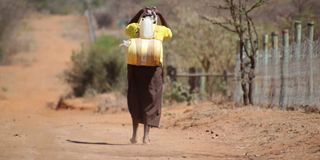COP29: Scientists warn women could spend 30 per cent more time on water collection by 2050

A woman carrying water on her back after fetching from a local dam at Daiga area in Laikipia County on February 24, 2023. Scientists have warned that women could spend 30 per cent more time on water collection by 2050, trapping them in poverty cycle.
What you need to know:
- At COP29 in Baku, women from across Africa are demanding urgent climate justice, highlighting how women spend up to 4.5 hours on unpaid domestic work compared to men's 54 minutes.
- Scientists warn the situation could worsen by 2050, with women potentially spending 30 per cent more time collecting water due to climate change impacts.
Last week, women in Senegal held a peaceful march in Dakar, demanding climate justice at COP29, which commenced on November 11, 2024, in Baku, Azerbaijan, and is set to conclude on November 22, 2024.
One of their banners highlighted the dire situation in Soum, a district that has lacked access to clean water since 2015. A recent study by scientists at the Potsdam Institute for Climate Impact Research, which assessed how gender shapes individuals' experiences of climate change, found that by 2050, increased temperatures and altered rainfall patterns could result in women worldwide spending up to 30 per cent more time collecting water.
In Kenya, data from the Kenya National Bureau of Statistics indicates that women spend four and a half hours on domestic and unpaid care work, compared to just 54 minutes for men.
This work includes fetching water, and the more time women spend on these tasks, the less opportunity they have to engage in income-earning activities. This, in turn, limits their chances to explore economic opportunities and, in the long term, can condemn them to poverty.
Climate talks
Despite these realities, women have been under-represented in climate negotiations for years, although meaningful efforts have been made to improve their situations amidst harsh climate extremes. For instance, thanks to the five-year Enhanced Lima Work Program on Gender and its Gender Action Plan — set to conclude this year — 62 initiatives across the continent have been launched to promote equal and meaningful participation of women in the United Nations Framework Convention on Climate Change process, according to a report from the UN climate body.
While women's representation in climate talks has increased from 31 per cent at COP14 to 34 per cent at COP28, it has fluctuated from year to year.
Despite this variability, Kenya has made strides in including women in climate processes since the implementation of the Lima Program.
In 2016, the country enacted the Climate Change Act and the National Adaptation Plan, both of which contain explicit provisions for women's contributions to climate change adaptation and mitigation efforts.
Additionally, the Climate Smart Agriculture Strategy (2017) specifically addresses the unique climate-related challenges faced by women.
Last September, 122 climate justice organisations representing women climate advocates wrote to the incoming COP29 presidency, urging the renewal of the program.
“The COP29 leadership has released several statements without significant references to plans, strategies, or support for the successful renewal of the Enhanced Lima Work Program and its Gender Action Plan,” they stated in a letter dated September 16, 2024.
The organisations emphasised that any renewal of the program must be accompanied by a strengthened commitment to gender equality and effective solutions to the climate crisis, as women are disproportionately affected by its impacts.
Mwanahamisi Singano, Director of Policy at the Women’s Environment & Development Organisation, asserted that without the Gender Action Plan, women would continue to be underrepresented in climate negotiations.
“For equal representation to be achieved, all governments must commit to equitable representation within their delegations,” she stated.
Gina Cortés Valderrama, focal point for the Women and Gender Constituency, highlighted the urgency of expediting discussions to renew the Gender Action Plan.
“Talks in Baku in November will only succeed if the essential groundwork is done in advance, but with only two months left, time is running out,” she warned.





